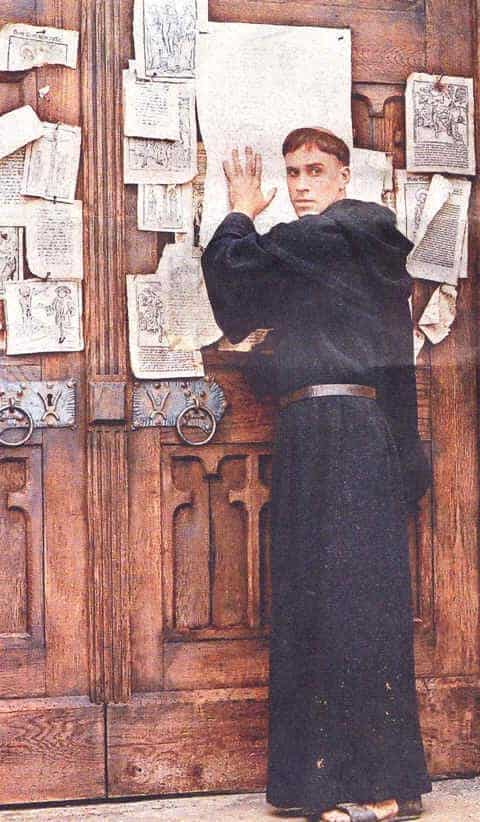
Reformation Sunday is the Sunday in October closest to October 31st. On October 31, 1517, in Wittenberg, Germany, a brilliant and brave German monk posted 95 serious grievances he had with the existing church. He did so out of a love for Christ and the gospel. It is from this event that we usually date the beginning of the Protestant Reformation.
The monk’s name was Martin Luther. He and many others called the church back to the distinctives of Biblical Christianity: such as Scripture alone—as our supreme authority under Christ (verses the supremacy of church, experience, reason, or tradition), Christ alone (as mediator between God and man), grace alone (God alone is ultimately responsible for our salvation), justification by faith alone (we cannot earn our way to God’s favor—we must trust in Christ), and to God alone be the glory (all that we do must be for the glory of God).
Luther was not alone in this mission. This year especially, we remember not just Luther, but also John Calvin. If Luther was the father of the Reformation, Calvin was its greatest theologian and pastor. Some have called him the most important Protestant theologian of all time.
But on Reformation Sunday, we don’t celebrate these individuals, for they were flawed saints who would not want all this attention. Rather, we celebrate their passion to see the church reformed by the Word of God.
Of course, in celebrating our Reformation heritage, we don’t forget the faithful Christian witness that extended in the early and medieval church. We need to remember the witness of other great Christians like Augustine, Ambrose, Anselm , Bernard, Chrysostom, Patrick, Pascal, Wycliffe and many others. We give thanks for the achievements of those centuries—the gathering of the Scriptures, early Bible translation, bold Christian witness, early apologetics, the discoveries of faith seeking understanding, pioneering missionary work in pagan Europe, the formation of great creeds, the challenge of how to live in persecution, in chaos and in victory.
But in the late 15thth century the Western Church was in trouble. God used men like Luther, Calvin, Zwingli, Knox and Cranmer to bring great reform to the Western Church.
The Reformation has sometimes been called one of the greatest revivals since Pentecost. While nothing compares with Pentecost, pause and think about what was recovered in the 16th century by the Reformers. They recovered the gospel, they attempted to make the Word of God central again, the sought to bring simplicity back to worship and church life, they sped up the work of Bible translation, and they rediscovered the notion of common calling.
One of the watch words of the reformation was Ad fonts. It is a Latin expression which means “to the sources” (lit. “to the fountain”). In the mouths of the Reformers it meant—back to the gospel, back to the Scriptures, and ultimately back to Christ.
Listen to two passages from Calvin’s early writings: To his preface to the translation of the Bible by Pierre-Robert Olivétan (1535) Calvin gives the characteristic title: To all those who love Christ and his gospel, and then continues: “Without the gospel everything is useless and vain; without the gospel we are not Christians; without the gospel all riches is poverty, all wisdom, folly before God; strength is weakness, and all the justice of man is under the condemnation of God. But by the knowledge of the gospel we are made children of God, brothers of Jesus Christ, fellow townsmen with the saints, citizens of the Kingdom of Heaven, heirs of God with Jesus Christ, by whom the poor are made rich, the weak strong, the fools wise, the sinners justified, the desolate comforted, the doubting sure, and slaves free. The gospel is the Word of life.” And in his reply to Cardinal Jacobus Sadoletus (1539) he emphasizes our total dependence on Jesus Christ: “As all humankind are, in the sight of God, lost sinners, we hold that Christ is their only righteousness, since by his obedience he has wiped off our transgressions, by his sacrifice appeased the divine anger, by his blood washed away our stains, by his cross borne our curse, and by his death made satisfaction for us. We maintain that in this way humans are reconciled in Christ to God the Father, by no merit of their own, by no value of works, but by gratuitous mercy.”
The reason many of us pause to look back on Reformation Sunday, is because the church in our day desperately needs revival and reformation. There is much straying from the Scriptures. On the one hand, many in the old main line Protestant churches have for some time denied sola Scriptura (the supreme authority of the Bible under Christ). Evidence of this shift is becoming abundantly clear. Some denominations allow openly homosexual clergy and agree to bless gay unions. They drift from affirming the uniqueness of Christ as Lord.
On the other hand, all is not well with Evangelicals Protestants. For many of our so called “Bible believing churches” simple do not take the Bible seriously. Consider the amount of unresolved conflict in our churches and the way we often treat fellow believers. We talk a good game, but our actions fail to show it.
Reformation Day is a reminder each year to come back to the Word. Why? Because churches, like people, live, thrive, and regain our bearings by the Word of God. Jesus said, “man does not live by bread alone, but on every word that comes from the mouth of the Lord” (Matthew 4.4).
Reformation Sunday is a great occasion to call our churches……..back to the sources.
